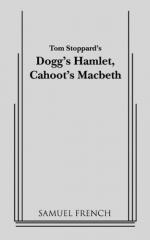|
This section contains 291 words (approx. 1 page at 400 words per page) |

|
Language
Stoppard's obvious technique in both plays is his manipulation of language, something for which he is known. In this play, however, he creates an entirely new language, Dogg. Although at first it seems like the language is random, as Stoppard shows through his characters' interactions, he has chosen many of his words very carefully. For example, in some cases, harmless English words translate into insults or inappropriate slang in Dogg. In Dogg's Hamlet, Easy tries to say "Afternoon, squire" to Dogg, the supervisor on the job. However, as Stoppard notes in the translation brackets: "[This means in Dogg, *Get stuffed, you b——.]"
When the inspector asks Cahoot if he would like to make a statement, Cahoot quotes a line from Shakespeare's Macbeth: "Thou hast it now: King, Cawdor, Glamis, all / As the weird sisters promised." The inspector, responding to the "weird sisters" part, says, "Kindly leave...
|
This section contains 291 words (approx. 1 page at 400 words per page) |

|




